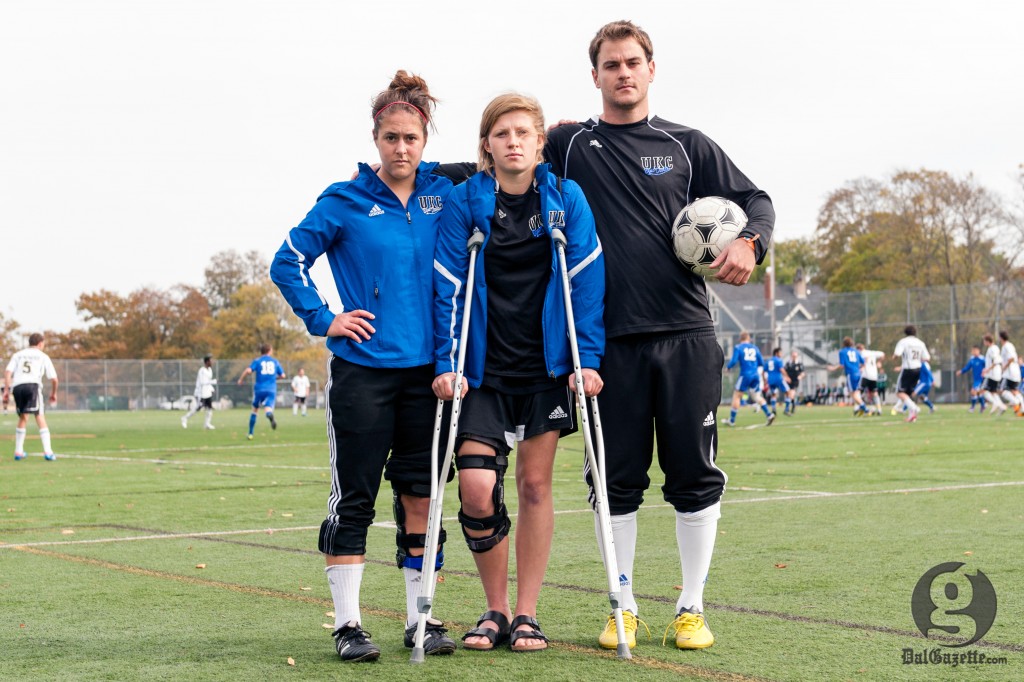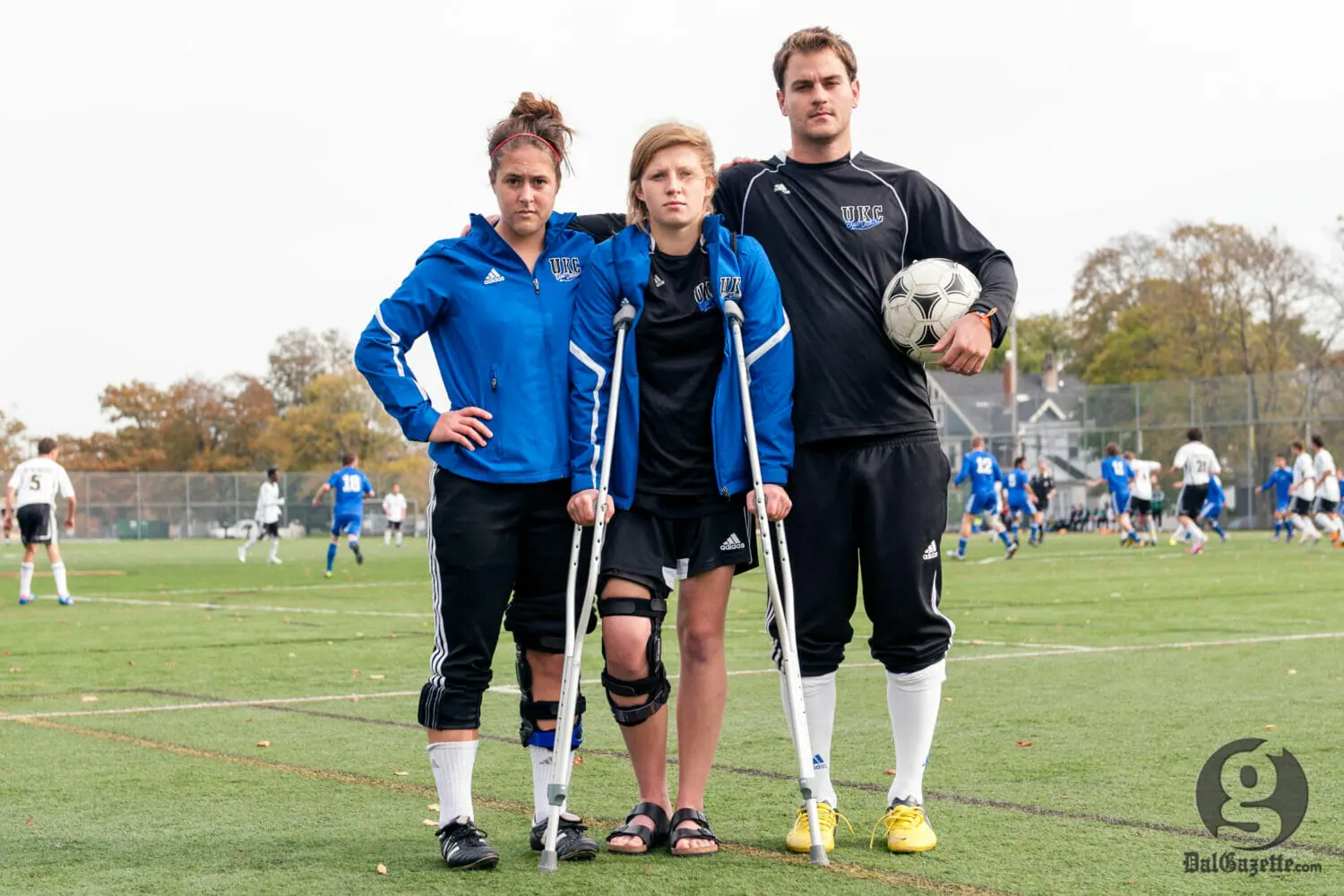
Student athletes at the varsity level make sacrifices. They give up sleep, partying with their friends and a lot of their free time.
Most of all, student athletes sacrifice their bodies for the love of the game.
Dylan De Paul, a fourth-year kinesiology student, knows more about sacrificing his body for a sport than most.
De Paul is the captain and flanker for the University of King’s College rugby team and is currently suffering from stage three whiplash, otherwise known as primary frontal impact, an injury common with car accident victims.
Although De Paul sat out most of the season due to his injury, he is no stranger to fighting through the pain. He has played through cracked ribs, a torn MCL, a torn deltoid ligament, a fractured wrist, broken knuckles, broken fingers and chronic neck issues.
De Paul says he always tries to follow a saying in rugby. “There is a difference between being hurt and being injured,” he says. “If you’re hurt, you push through it, but if you are injured, that is when you can take a knee and come off.”
Coaches sometimes motivate players to play through their injuries, but De Paul says his coaches have been nothing but supportive.
“I’ve never felt pressured to play. They are more concerned about our well-being,” says De Paul.
After all the injuries De Paul has experienced, he says there’s one reason why he keeps playing.
“I love it.”
Andrea Gillis, a third-year science student and member of the UKC women’s soccer team, has also been sidelined. Unfortunately, the new player to the team hasn’t played a regular season game in the Blue Devils uniform because she tore the meniscus in her right knee in her first exhibition.
After spending countless hours at physiotherapy and hundreds of dollars on treatment, Gillis was able to see a surgeon who recommended immediate surgery.
Gillis has already had a difficult path trying to return the pitch. She didn’t even have the opportunity to play soccer in her first year because she was still recovering from one of the five surgeries she has undergone for sports-related injuries. Gillis has had three knee surgeries, one hand surgery and a nose surgery.
Despite all that, she still had to make the choice all athletes dread: to play through her injury, after already having missed more than half the season, or to get the surgery recommended by her doctor.
For Gillis, who switched out of her program at Dal to play soccer for King’s, this was a decision she never wanted to make. Nevertheless, she knew she needed the surgery.
“If I can push through it, then it’s worth it,” says Gillis. But after just one practice the day after talking to her surgeon, Gillis knew the pain was too much to push through.
“Soccer is my outlet,” she says. “I want to be able to play when I am 30 or 40. It just wasn’t worth it to not get the surgery and potentially never play again.”
Gillis now plans on taking a break from school to work and do some traveling.
Much like Gillis, Brendan Parsley’s season and his career as a forward for the UKC men’s soccer team has come to an end due to injury.
Parsley, a fifth-year history and political science double major, came into his final season with a nagging groin injury that prevented him from playing the majority of last season, and he was only able to play in two league games this year.
Parsley sees a physiotherapist a couple of times a week for treatment. This includes stretching and strengthening exercises, ultrasounds and painful dry needling that over the years has racked up a hefty bill.
Knowing that his groin injury was severe and that he could further injure himself if he continued playing didn’t stop Parsley from trying. He says the eligibility rules involved in university sports plays a huge role in why so many athletes push through brutal injuries.
“Everything is so short here. It’s not like in pro sports where if you’re injured there is a certain timeline and you can come back,” explains Parsley. “Here, you only have a certain amount of eligibility. Like, you know it is going to end, and you have to be better before then.”
In his last game against Holland College Parsley sustained another injury, putting him out for the last few games of the season and gaining himself a seat on the bench for the remainder of his UKC career.
The story of Sarah Wojcik’s battle through injuries has been one of perseverance. Last season, the fourth-year neuroscience student and centre midfield for the UKC women’s soccer team devastatingly tore her MCL and partially tore her ACL halfway through the season. The injuries caused Wojcik to sit out the rest of the year—her knee was too swollen to tell what damage had been done.
Although she narrowly avoided surgery, she wasn’t expected to return to the field. During this preseason, however, Wojcik surprised everyone and began playing again.
Wojcik sees a physiotherapist five times a week, wears a knee brace and controls her pain with ibuprofen. She knows by playing through her injuries, she could potentially injure herself further—to the point where she may never play again.
Like her King’s teammates, Wojcik credits her desire and will to play to the “love for the game.”
“I don’t think I could have gotten to where I have gotten without the support from my coaches and my teammates.”
Editor’s Note: Lucie Edwardson is a member of the King’s women’s soccer team.


Recent Comments